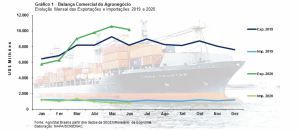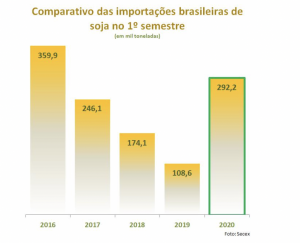A prolonged military conflict in the Middle East could potentially upend key commodity markets due to Iran’s control of the Strait of Hormuz, one of the world’s most important trade…
Brazilian Agribusiness Exports Set a Record, as Domestic Supply Difficulties Begin
Brazilian agribusiness exports were at record levels in June 2020, with foreign sales of US$ 10.17 billion. There was a growth of 24.5% in relation to exports in June 2019 (US$ 8.17 billion). The result was released last Friday by the Department of Commerce and International Relations of the Ministry of Agriculture of Brazil.

The main sector responsible for the growth of exports was the soybean complex. Foreign sales in the sector rose from US$ 3.53 billion in June 2019 to US$ 5.42 billion in June 2020, representing an increase of 53.4%. The export of soybeans in grains (13.8 million tons) had a great influence on these values, reaching US$ 4.67 billion in June 2020. China was the main country responsible for expanding the volume exported by Brazil, acquiring 70% of Brazilian soybeans in June.
#Notícias | #BalançadoAgro
— Ministério da Agricultura (@Mapa_Brasil) July 10, 2020
As exportações do agronegócio no mês de junho de 2020, um total de US$ 10,17 bilhões, foram as maiores comparadas ao mesmo período desde o inicio da apuração destes dados, em 1997. pic.twitter.com/eFZsBrIplp
With record volume of soybeans exported in the first half of the year too, Brazilian companies are beginning to have difficulties in supplying themselves, according to a report of Center for Advanced Studies in Applied Economics (Cepea), from University of São Paulo (USP). Companies in the South of the country already import soybean from Mercosur. In June, according to Cepea, Brazil purchased almost 90 thousand tons of soybeans (only from Paraguay), more than double that acquired in May and the largest volume imported since 2016.
And it was not only in June that the Brazil bought more soybeans. The entire semester registered an increase in the quantities of soybean imported in 2020, reported the Canal Rural website.

Cassiano Ribeiro and Fernando Barbosa reported in the Globo Rural magazine that the increase in space in the foreign market is attributed to the rise in the dollar, which makes Brazilian products competitive and cheaper for foreign buyers. And also due to the increased demand from the main customers, who begin to return to shopping after the quarantine imposed by the pandemic of the new coronavirus. Lastly, because other important global players are facing difficulties to supply the appetite of importers, such as the United States.
Meanwhile, Brazil has emerged as the world’s largest soybean producer. O Estado de S. Paulo writer Vinicius Neder showed that Brazilian farmers overtook the position of the United States with a record harvest of 119.9 million tons of soybeans in 2020. And projections indicate that Brazil will also continue its position in the next harvest, reinforcing the good performance of Brazilian agriculture and livestock, even with the covid-19 pandemic.
>@EstadaoEconomia Com supersafra, Brasil se consolida como maior produtor mundial de soja https://t.co/Jewi3I4dSx
— Estadão (@Estadao) July 8, 2020
Another product that helped increase Brazilian exports was meat. The volume of meat exported was also a record for the months of June (626.5 thousand tons). Beef represents more than half of the exported value of meat, with records of US$ 742.56 million and 176.6 thousand tons. Pork meat also showed record value and volume in foreign sales for the month of June. Exports totaled US$ 196.86 million, with a volume of 95 thousand tons. China imported half of the beef and pork exported by Brazil in the period.
China’s supremacy in the meats was confirmed also in the first half of the year. The Zero Hora newspaper article noted that the big Chinese participation is not seen with concern by the industry, which also does not see the scenario as dependent:
“We are not depending on China, the China that is buying more from Brazil. But that does not mean that we have left out other markets,” affirms Ricardo Santin, executive director of Brazilian Animal Protein Association (ABPA).
Also last week, the Ministry of Agriculture of Brazil announced that the Gross Value of Agricultural Production (VBP) should reach a record of R$ 716.7 billion in 2020. Valor Econômico writer Marcela Caetano explained that once again soybeans pushed this growth by reaching a historic harvest, which was favored by the exchange rate.





